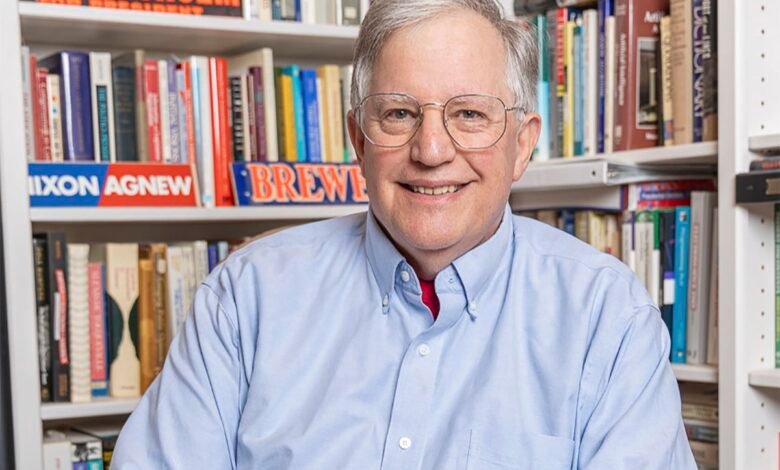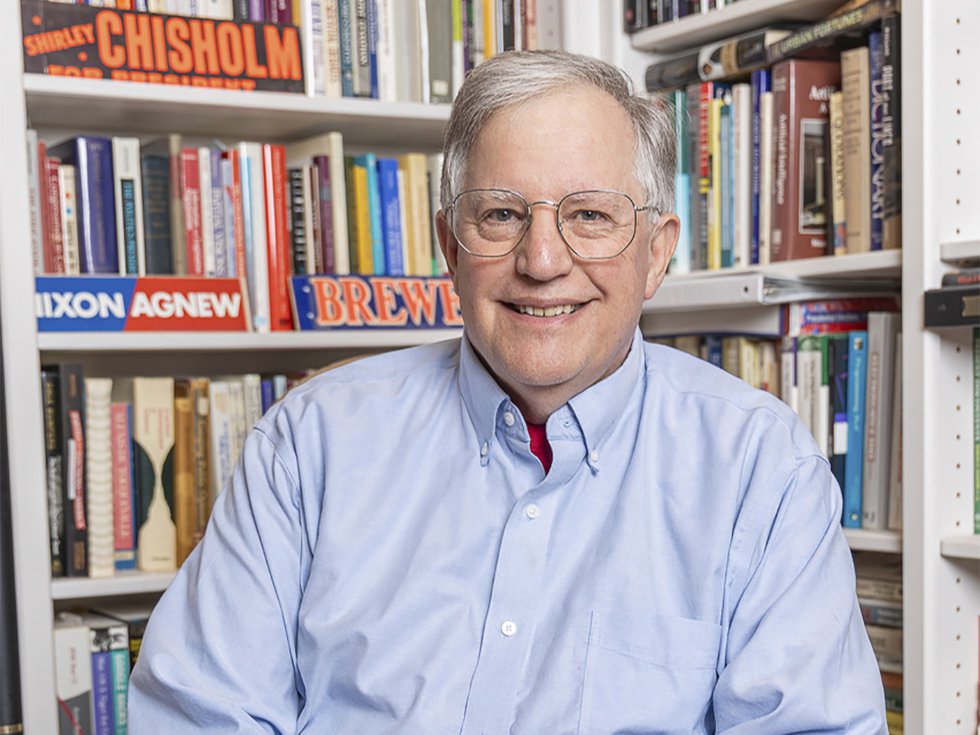The dean of Wisconsin pollsters – Isthmus


On a wall of his home basement office, jammed with computer screens and a microphone for interviews, Charles Franklin has a framed copy of the historic Nov. 4, 2008, call by ABC News that Democrat Barack Obama would be elected president signed by all members — including Franklin — of the network’s prediction team.
The call team signed the prediction due to the historic nature of the country electing its first Black president, says Franklin, who was a key member of the network’s forecast team from 2002 to 2020.
Franklin, the reigning dean of Wisconsin pollsters, showed early aptitude for the work: As a high school sophomore in Union Springs, Alabama, he surveyed second, fourth and sixth graders on what they watched on TV on Saturdays. It was not his best effort. “Second graders couldn’t handle pencil-and-paper questions,” he says.
More than five decades later, as the director of the Marquette University Law School Poll he started in 2012, Franklin is still fascinated by numbers, what people share with him, and how to find new ways to get them to answer 45 questions.
“I really want to know what people are thinking, want to see how they put things together. I want to see what [demographic] groups are going one way or another [and] if they’re changing over the course of the campaign,” Franklin says.
“I could do all that as an academic political scientist, and I did,” adds Franklin, who joined the UW-Madison political science department in 1992. “But at Marquette, it’s for public audiences. We get to inform that discussion by talking to 1,000 people.”
His September poll of 822 registered voters said Democrat Kamala Harris led Republican Donald Trump in the presidential race by a margin of 52% to 48% and Democrat U.S. Sen. Tammy Baldwin led Republican challenger Eric Hovide, 52% to 47%. The poll had a margin of error of 4.6%.
Since Franklin’s first 2012 polls — when Democrats questioned his numbers on a potential recall of Republican Gov. Scott Walker and Republican talk radio hosts doubted his numbers for the first U.S. Senate campaign of Republican Ron Johnson — Franklin proudly says the error rate for Marquette’s polls has averaged 2.2%.
That rate was 2.2% in 2022, for example, when Wisconsin voters re-elected Democratic Gov. Tony Evers and Johnson. It was 4% — “bad,” Franklin says — in the 2020 presidential election. In 2018, when voters first elected Evers and re-elected Democratic U.S. Sen. Tammy Baldwin, it was off by less than 1%.
But, yes, he’s still haunted by 2016, when his Marquette poll joined hundreds of others in concluding that Trump would lose to Democrat Hillary Clinton. “There’s no point in hiding it. We were off.”
Franklin’s last pre-election numbers in 2016 had Clinton ahead of Trump in Wisconsin by 6%. But Trump won Wisconsin by less than 1%. “Not only were we off by 6%, but we got the wrong winner.”
Eight years later, it’s a reason pollsters have the same public trust as used car salespeople, journalists and members of Congress, he jokes.
And there’s no joy that Franklin’s poll was just one of many wrong ones. “We didn’t know what was happening, and we didn’t know how to compensate for it.”
Despite 2016, Franklin’s Marquette poll is ranked as the third most accurate in the nation by fivethirtyeight.com. Its accuracy trails only the New York Times/Siena College poll and ABC News/The Washington Post poll.
And Franklin remains a respected national pollster and in-demand source for journalists. At one point this election cycle, the New York Times and London Times consulted him on the same day.
This year’s presidential election poses unique polling challenges.
Trump, the Republican candidate for the third time, was found guilty this year of 34 felonies, will be sentenced after the election, and has survived two assassination attempts. Democrats jumped in mid-campaign from President Joe Biden to Vice President Kamala Harris. And divided Wisconsin remains, for the third straight election cycle, one of the few states that will decide who is the next president.
To more accurately poll, Franklin has made two major changes in methodology: He’s sampling voters from the state’s registered voter list, instead of from up to 100,000 random calls like he did for 11 years. And, he’s divided the state into 90 regions so he can more accurately balance rural and urban areas.
Franklin says Wisconsin is almost equally divided between 46% Republicans and Republican “leaners,” and 44% Democrats and Democratic “leaners.” The remaining independents decide who wins.
The biggest change Franklin has seen in 12 years? The percentage of men without college degrees who self-identify as Republican soared from 4% in 2012 to as high as 25% this year. “Trump didn’t cause that shift,” Franklin notes. “But he followed along with it, and benefited from it for a while.”
Franklin was a tenured UW-Madison professor when he left to start the Marquette poll. Milwaukee journalist Mike Gousha was making news with his “On the Issues” interviews of public officials, but nobody had any insights on what voters were thinking. “My claim was, ‘Let’s hear what the public says,’” Franklin recalls.
Marquette Law School Dean Joseph Kearney, who hired Franklin to start the poll, which is financed with alumni contributions and not with students’ tuition, says it has exceeded all expectations. Kearney, who has “deep admiration” for Franklin, says the Law School Poll quickly gained national attention in 2012.
“The key in making that initial decision was my coming to recognize that the purpose of a poll or survey is to seek to establish facts,” Kearney recalls. “I began to appreciate in the run up to 2012 that the most important stakeholder without a good appreciation of real public opinion in Wisconsin was the public.
“Politicians and parties poll all the time, but they don’t release those results,’ Kearney adds. “Yet public opinion, not just on election preferences but also on public policy topics, is a fact.”
Kearney approved Franklin’s adding national polls on the U.S. Supreme Court in 2019. Why? “Nobody else was doing it, and we’re a law school,” Franklin says. “If anybody should be asking about the Court, it should be us.”
Scott Keeter, a senior policy advisor at the Pew Research Center and a former president of the American Association for Public Opinion Research, calls Franklin a “model for all of us in the public polling world.”
“Charles is both an accomplished craftsman of polls and a generous and clear communicator about them,” Keeter says. “Over the years he has retooled his polling to meet the changing circumstances of reaching and persuading people to talk.”
Franklin and his wife, Liane Kosaki, a retired UW-Madison dean, live in the same Madison house they moved to in 1992. They met at the University of Michigan, where Franklin did graduate work after earning his undergraduate degree at the now-closed Birmingham-Southern College.
Two things about Franklin may surprise you.
First, he’s not a registered voter. He stopped voting when he became a “public person.”
“I had to make calls about whether this state was going to be won by this candidate or that candidate. I didn’t want a ‘rooting’ factor in my calls,” Franklin says. “I always felt, if I had consciously backed one candidate, I didn’t think it would matter, but I could make sure it didn’t matter by not having cast that vote.”
Second, there’s the moments when he needs some heavy metal music — Deep Purple, maybe. “When I need some energy I do like the genre a lot.”
Franklin just turned 70. He plans to poll through the 2028 election cycle, but all bets are off after that: “I don’t expect to do this forever.”

